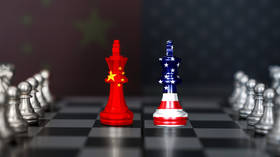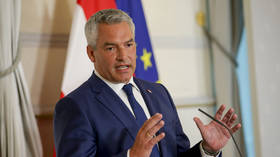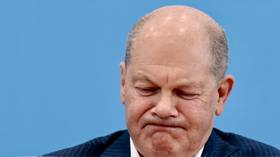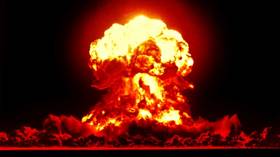‘Gambler Trump plays poker while China plays chess’, thinking a few moves ahead

The Trump administration is putting the US on a dangerous course by not assessing the long-term risks in the ongoing trade war with China, analysts told RT as tensions flare between the world's biggest economies.
The US-China trade conflict reached a new level after US President Donald Trump threatened to raise tariffs on $300 billion worth of Chinese products last week, breaking a truce reached at the G20 Summit. On Monday, the yuan plunged, triggering the worst selloff of 2019 on Wall Street and wreaking havoc on Asian and European markets, followed by Washington's accusations of currency manipulation against Beijing.
However, the Chinese currency has already been weak for some time, independent political analyst Alessandro Bruno noted. The fall of the renminbi is a headache for Chinese investors and companies who have debt in US dollars.
But the American side has even more to lose and Trump's mistakes can cost the US economy dearly, the analyst said.
"Trump is poker player, he is gambling. The Chinese, the Russians are chess players. The Chinese are thinking a few moves ahead of Trump," Bruno told RT. He added that the US president "has put himself into a hole" as the escalation of the trade conflict is poised to hurt the American and the European markets more than it will impact China in the long run.
Giving China the official "currency manipulator" tag gives the Trump administration leeway to further hit Beijing with punitive measures. For example, it can impose restrictions on Chinese companies or forbid American businesses to deal with Chinese counterparts, according to strategist Andrew Leung.
At the same time, the US Treasury's move signals another escalation of the ongoing US-China trade spat, researcher Peter Earle of American Institute for Economic Research believes.
"Overwhelmingly when a country denounces another using those specific terms, it's assumed that the intention is to plead its case before the International Monetary Fund, which means more uncertainty, more volatility in financial markets, and quite possibly more damage to both the US and Chinese economies," Earle wrote.
The accusation of 'currency manipulation' also becomes murky when one considers the fact that every central bank in any country manages the currency, allowing it to fluctuate within certain parameters. While some would call it currency manipulation, others see it simply as monetary policy responses to economic situations. Such was the case with Quantitative Easing (QE) programs by the US Federal Reserve, the ECB, and the Bank of Japan to deal with the effects of the 2008 financial crisis.
Also on rt.com Huawei lays off 70% of American research unit staff amid ongoing US crackdown on Chinese firmChina could also have been "artificially holding up the yuan's value (maintaining a 7 to 1 ratio) to avoid exactly the sort of accusations which finally came this week," according to Earle.
But while the US is tirelessly finger-pointing at China, its own monetary policy could be questioned, and it's not all about QE or interest rate changes. After former President Richard Nixon switched the dollar from the gold standard in 1971, the US became "the biggest currency manipulator in the world," analyst Alessandro Bruno believes.
While a further decline of the yuan does not really play into the hands of the Chinese economy, the devaluation could just be a test to see how much the US can "withstand this problem," because the move does put pressure on them, Bruno added.
At the same time, if Beijing lets the yuan go "into a downward spiral" because of large-scale capital flight, for example, it can trigger panic in the global financial markets, according to the director of Centennial Group, Manu Bhaskaran.
Also on rt.com US labeling China ‘currency manipulator’ will shake global financial markets – China’s central bankThe same is true for the whole US-China trade spat, which has already spooked investors around the globe, forcing many to seek safe haven in gold.
"Markets do not like unpleasant surprises and began to worry that the US-China dispute was in a downward spiral which could lead to very bad outcomes, far worse than anything that investors had earlier expected," Bhaskaran noted.
The trade war is also threatening to derail the strong growth of the US economy, and therefore damage Trump's re-election chances, analysts say. And while Trump is using China as the "perfect political campaign excuse," he has actually put the US on a "dangerous course," according to Bruno.
For more stories on economy & finance visit RT's business section














